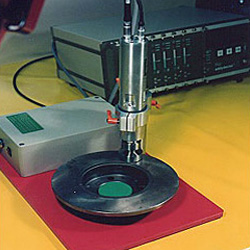
Eddy Current Inspection (ET)
Eddy Current inspection (ET) is one of several NDT methods that use the principal of electromagnetism as the basis for conducting examinations. Eddy current testing equipment performs three basic functions: generating, receiving, and displaying. The generating portion of the unit provides an alternating current to the test coil creating eddy currents through a process called electromagnetic induction. The receiving section measures impedance and processes the signal from the test coil to the required form and amplitude for display. Instrument outputs or displays consist of a variety of visual, audible, storage, or transfer techniques utilizing meters, video displays, chart recorders, alarms, magnetic tape, computers, and electrical or electronic relays.
One of the major advantages of eddy current as an NDT tool is the variety of inspections and measurements that can be performed. This inspection method is sensitive to small surface cracks, pits, subsurface cracks, corrosion on inner surfaces, and other flaws and is used to inspect parts of complex shape and size. ET gives immediate results and is widely used within the commercial, military, petrochemical, aircraft and aerospace industries. In the proper circumstances, eddy current can also be used for material or
coating thickness measurements, heat damage detection, and conductivity measurements for material and alloy identification.
The Level I Eddy Current course requires no prior training or experience by the student. This courses is ideal for NDT trainees who must have Level I training in order to qualify for certification and the Level I course is well suited for personnel who are responsible for or oversee the application of testing or Quality Control/Quality Assurance.
Course Content
E2510 Basic Theory and Application of Eddy Current Level I - Click Here for Upcoming Eddy Current Class Schedule
This fundamental course is presented in a 40-hour classroom course and provides the essentials in electromagnetic theory, test instrumentation and coil design, and basic impedance plane principles. Other topics studied include conductivity, dimensional factors (lift-off and material thickness), permeability, signal-to-noise ratio, frequency, and flaw detection applications. Ample time is allowed for technique demonstrations and hands-on lab exercises. Lecture notes, text book and necessary testing materials are provided.
This curriculum satisfies the training hours recommended by The American Society for Nondestructive Testing for Level I studies. Lesson-by-lesson quizzes monitor progress and all three evaluation examinations (General, Specific and Practical) are included.
U2411-WB Introduction to Eddy Current; Basic Principles and Application - Online Course
Online courses are ideally suited for technicians that are in need of refresher training or for trainees that have other means of gaining hands-on experience. All online courses include the "body of knowledge" recommended by ASNT and includes a final exam that can be utilized as the method's General Examination.


